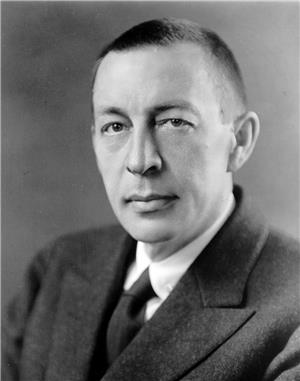On February 21, 1925, a capacity crowd of 1,200 people makes its way to the Tacoma Theatre to hear world-famous composer and pianist Sergei Rachmaninoff perform. A few audience members may have had the chance to hear Rachmaninoff live once or twice before, as he had played in Seattle and Portland in recent years. Others likely enjoyed hearing his performances in the comfort of their own homes, playing one of his many recordings on their Victrola machines. But this is the first and only time Rachmaninoff will visit Tacoma in person.
Bernice Newell Recruits Rachmaninoff
Sergei Rachmaninoff (1873-1943) originally envisioned for himself a peaceful life as a composer, enjoying the autonomy of working at his family's estate in the Russian countryside. Following the Russian Revolution of 1917, however, Rachmaninoff's family were forced to leave Russia, and by 1918 they had settled in New York City. With this upheaval, Rachmaninoff turned to performance as a more reliable means of supporting his family, and over the next few decades would perform in virtually every large and mid-sized city across North America.
Bernice Newell (1862-1937), a prominent Tacoma citizen and booster, was singlehandedly responsible for Rachmaninoff's Tacoma visit. Although Newell was born in New York and died in California, she spent most of her life in Tacoma. Within just a few years of her arrival, Newell was utilizing her position as the society editor and music writer for the Tacoma Daily Ledger – where she would work for nearly 40 years – to advocate for the cultural development of the young city.
One of the earliest examples of such work was a bold article she wrote for the Daily Ledger in advance of U.S. President Theodore Roosevelt's May 23, 1903, visit to Tacoma. At the time of Roosevelt's visit, Point Defiance Park belonged to the federal government, and there was a possibility that the park would be reclaimed for military use. Newell's article proposed to kidnap the President and take him on the streetcar to see the park. Her plan was to show him the beauty of Point Defiance and convince him to give the park to the City of Tacoma for citizens to enjoy for generations to come. In 1905, thanks to the efforts of Newell and other Tacoma boosters, Roosevelt did just that.
Beginning in those early years of the century, and reaching a climax in the 1920's, Newell managed what she called her "Artist Course" concerts, bringing a substantial number of prominent classical musicians to Tacoma. Her work was recognized in national media, and the concerts were unfailingly well-attended and enthusiastically reviewed in the local papers. Although Newell occasionally choose other venues for her concerts, she most often selected the Tacoma Theatre, with its large stage and seating capacity.
Tacoma had an active musical scene of its own, with many local musicians – amateur and professional alike – performing regularly. Newell clearly believed, though, that the concert calendar was not complete without visits from prominent world-class musicians. Through her "Artist Course," she was responsible for Tacoma concerts by some of the most famous orchestras, violinists, pianists, and opera singers of the day.
World-class Performance
Looking specifically at 1925, the year of Rachmaninoff's visit, we see an example of what Newell meant by a 'course' of concerts. In the span of less than one month, four world-class performances were presented at the Tacoma Theatre. Rachmaninoff performed on February 21; on March 3, audiences could hear French pianist Alfred Cortot; March 10 featured violinist Fritz Kreisler, followed on March 16 by Metropolitan Opera singer Florence Easton. Ticket prices to listen to these performers in the opulence of the Tacoma Theatre ranged from $1.10 to $2.75. Only a few months later, the theater would close for its remodel into a venue for film.
As is clear from the reviews in local papers, the concert was a great delight to a large audience who had traveled from around the South Sound to hear the great artist play:
"Sergei Rachmaninoff at the Tacoma Theatre Saturday evening played a program of wonderful music before a great audience composed of music lovers and students of Tacoma and all the surrounding territory, and it is doubtful if any single artist has ever been received with more earnest enthusiasm and sincere appreciation than was accorded the great Russian who stands in the very front of world artists of the present day.
"The program given by Rachmaninoff was selected from the compositions of world masters, and was played with such breadth of understanding and ease of manner as to give the impression of a giant giving largess to his followers who were eagerly grasping for the wealth of his generous bounty. With every number came storms of applause that sounded like the falling of many waters, and the tall, spare figure, slightly bowed, with its grave, expressive face, over which a serious smile crept in response to the enthusiasm of the audience, returned many times to respond with bows, and as the program progressed, to give the encores to greatly desired.
"Technique past all belief, high intelligence and transcending beauty marked the playing of the Russian master. The Beethoven variations were fraught with beauty and charm. The heavenly Schumann Sonata revealed a new glory with each succeeding movement and, to the high credit of a Tacoma audience, not a handclap marred the effect as the noble work progressed, until the very close of the work" (Rachmaninoff is Acclaimed Here").

